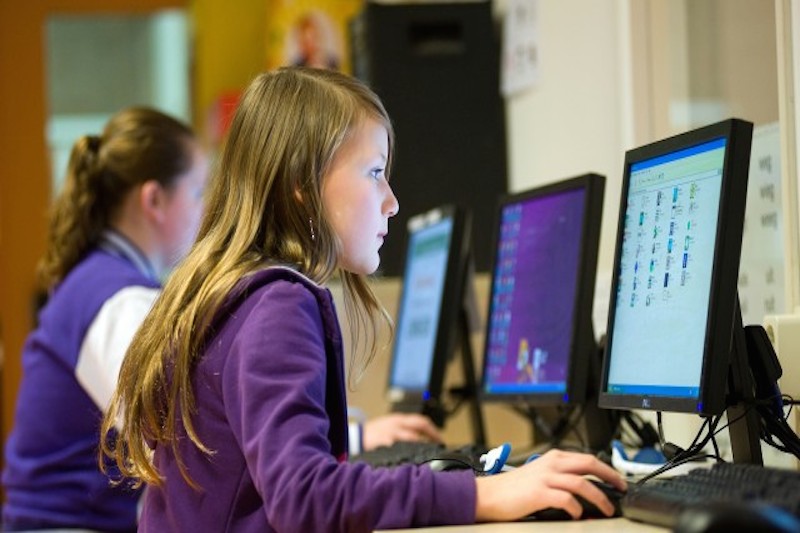Google’s school sweeteners for children’s data
Project dressed up as 'machine learning workshop' gives Google rights to biometrics for product development

Parents, campaigners and politicians have hit out at Google for incentivising schools so that the company can collect data from primary schoolchildren.
Google’s data grab came to light when a parent of an eight-year-old child at Rokesly Junior School in Haringey, London, queried whether they should sign a permission agreement that came home from the school about upcoming events.
The documentation provided little information about the specifics of the project, but asked parents to allow children to take part in a workshop that would film pupils interacting with a prototype, with any footage belonging to Google, globally and in perpetuity.
“Parents have contacted me concerning the release of their children’s data to Google for educational purposes,” says Catherine West, the Labour MP for Hornsey and Wood Green.
“The intrusion of technology companies into every corner of our lives, including primary-aged children, is extremely worrying and needs to be challenged. I’ve written to DCMS to ask how prevalent this intrusion is and to ask what safeguards and guidance the government is offering to schools and parents.”
The scheme has sparked concern over how much data is being collected in schools as well as what will be done with that data, with Google criticised for couching the project as research when closer examination shows that any feedback (whether that be video or voice footage) would be used in future product development.
“Swindling parents”
In the documentation, parents are told: “Year three are participating in a workshop ran [sic] by Google about machine learning.”
Get the ITPro daily newsletter
Sign up today and you will receive a free copy of our Future Focus 2025 report - the leading guidance on AI, cybersecurity and other IT challenges as per 700+ senior executives
However, critics question the educational value of the so-called workshop. “It says: ‘You agree to let Google use any feedback to develop or enhance Google’s current or future products,’ and I think that’s the crux of it,” says Jen Persson, director of education-focused privacy group Defenddigitalme. “I think they are swindling parents on this and it’s an absolute shocker that they are packaging ‘give us your biometrics (which we can use forever to develop a product)’ into something seemingly innocuous like taking part in a research study.
“It’s far beyond what should be acceptable in school on ethical and lawful grounds.”
A parent who spoke to IT Pro’s sister title, PC Pro, laid no blame on the school, while West’s office also said parents “have stressed that they are not complaining about the school and appreciate the difficult situation they are in due to funding, and the concerns are solely at the door of Google”.
It’s as yet unclear whether the school will receive any financial rewards under the project, although pupils have been offered £1 for taking part. Experts believe schools will receive some sort of benefit for taking part, which fits into a wider tech-for-access programme in schools. “The school gets access to tools and data they would not otherwise have – the lack of adequate IT resources in education is a serious problem,” says Rowenna Fielding, head of individual rights and ethics at Protecture.
“This lack of resources has created a gap in the market for commercial organisations to sidle into, and they’re not doing it out of kindness. Unless the schools are very careful about these sorts of partnerships, they risk putting the rights and futures of students at serious long-term risk for what may be very little short-term benefit.”
According to Persson, such data raids on schools have occurred in the past. “We know of several projects that happen through schools and that are public interest research projects, either run by academics or government departments and partners like Behavioural Insights, and they will pay a school typically £1,000 to take part,” she says.
Critics also expressed concerns that parents unwilling to sign the forms would see their children miss out on lessons, with the school’s note stating that “where consent is not given… we will remove your child from the workshop”.
“It’s highly problematic – it puts the education of the child on a conditional footing and makes it dependent on their exploitability for commercial interests,” says Fielding. “It’s also a mockery of the notion of ‘consent’ – this isn’t an informed and free choice, it’s coercion.”
Neither the school nor Google have answered requests for comment and it’s unknown how many other schools are taking part, but Haringey Council, which oversees local education, washed its hands of the affair.
“Individual schools are responsible for ensuring any projects or systems they interact with, including where pupil data is shared and stored, are fully GDPR-compliant and that pupil data is protected according to the law,” a spokesperson told PC Pro. “It looks like an opt-in trial which parents can choose whether or not to be involved in. The local authority would not need to clear this.”
This comes a month after details of millions of pupils were leaked via a Department for Education partner.
-
 Bigger salaries, more burnout: Is the CISO role in crisis?
Bigger salaries, more burnout: Is the CISO role in crisis?In-depth CISOs are more stressed than ever before – but why is this and what can be done?
By Kate O'Flaherty Published
-
 Cheap cyber crime kits can be bought on the dark web for less than $25
Cheap cyber crime kits can be bought on the dark web for less than $25News Research from NordVPN shows phishing kits are now widely available on the dark web and via messaging apps like Telegram, and are often selling for less than $25.
By Emma Woollacott Published